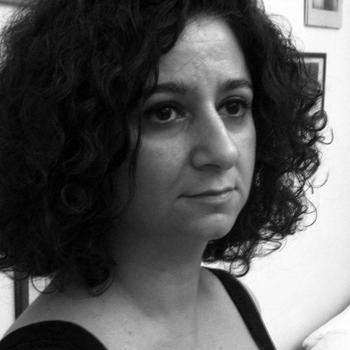Lina Saneh

Interweaving Performance Cultures
Fellow 2009/10
Lebanese actress, writer and director Lina Saneh completed her Ph.D. in 2005 at the Sorbonne Nouvelle in Paris. Her work is concerned with thinking the particularity of the Lebanese experience, questioning the signs of social and political daily reality, the contradictions and conflicts generated by the suspended project of the political and modernity in Lebanon and the Middle East. If at first her thought articulated itself essentially around the actor’s body and its relationship to space, today it is oriented towards the political word uttered here and there. She questions her citizenship and her place within public space, the notion of representation and the relation between fiction and the real. Lina Saneh is an Assistant Professor at Saint Joseph University in Beirut and at HEAD in Geneva. Her works include Ovrira (1997), Extrait d’Etat Civil (2000), Biokhraphia (2002), Appendix (2007) and Photo-Romance (2009); I Had A Dream, Mom (video, 2006), Someone Must Have Been Telling Lies about Me (video installation, 2008) and Lina Saneh Body-P-Arts Project (a website project, 2007 and installation, 2009).
Research Project
Community vs. the Individual: Limits and Constraints of Performance Art in Lebanon and the Arab World
Action, representation, image, body, time, space, … the numerous stakes of theatre and performance art; but also political issues that have long intrigued, troubled and worried philosophers. I particularly wish to focus on political, philosophical and contemporary artistic readings of these notions, such as representation in Jacques Rancière, action in Hannah Arendt, the question of the image (chiefly in Baudrillard), and others; to see how these approaches are to be found in contemporary art practices; and then to evaluate the distance that separates Lebanese and Arabic artists from their desire for effective action, in terms of historical issues, i.e. in the socio-political context. Indeed, what kind of action is possible within community-based societies in which the individual has no place? What representation—artistic or political—is possible (since it assumes a distance between words and things) in a religious and/or totalitarian society in which words are things? Which limits and definitions are to abolish when the image is still perceived as belonging either to the register of a reflection of a profound reality, or that of its mask and distortion?
